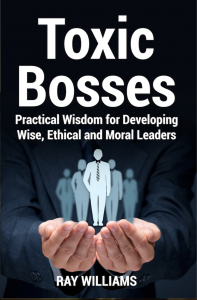By Ray Williams
May 20, 2021

Many parents today wonder what kind of world their children will grow up to inhabit. Will they face ongoing deadly pandemics? Will the planet be ravaged by extreme climatic events, depleted of vital oceans, forests and biodiversity? If we don’t want to leave the planet in ruins for future generations, we need to think about how we act today — and maybe change our ways.
We need not only to act in altruistic ways for others today, but also for the sake of future generations.
Some changes are likely to involve changes in lifestyle—buying electric cars, recycling our waste, or walking to the supermarket. The benefits of these gestures will largely be felt in the long term, so they can be seen as a kind of altruism towards, or cooperation with, our children, their children and so on into the indefinite future.
What makes people act this way? Since Darwin’s time, biologists, economists and psychologists have been developing theories of how cooperation and altruism can evolve, and the factors that nurture these prosocial traits. One basic insight is that cooperation and altruism are much more likely to emerge when people know they will continue to interact with each other for the long term, under what University of Michigan professor Robert Axelrod calls the “shadow of the future”.
But what about when this shadow falls on people who haven’t been born yet, and who won’t therefore be able to reciprocate our kindness? What promotes cooperation in these situations? This is the question that University of Exeter economist Oliver Hauser and colleagues set out to answer, the results of which were published in the journal, Nature.
Cooperating with the future
Studies of cooperation usually involve economic games in which people can act selfishly or cooperatively with other members of their group. In exploring the dynamics of intergenerational cooperation, however, Hauser and colleagues had to invent a new kind of economic game, one that could capture the idea of cooperating with the future.
So they came up with the online Intergenerational Goods Game. To begin with, people are put into groups of five to form the first “generation” of the game. This generation is endowed with 100 units that represent a resource that can be extracted from the environment. Each player in the first generation then independently decides how many units, up to a maximum of 20, to withdraw from the common pool of 100. Every unit a player takes adds 5 cents to their personal turn-up fee of $0.50.
Each group of five players is told that if they collectively withdraw 50 units or fewer from the common pool, then the units are replenished back up to 100, and passed on to the next generation (another group of five) and so on, who will then have the chance to play the same game. If, however, the group exceeds the 50-unit threshold, then the next generation inherits nothing. This means that if the average number of units individual players took is greater than 10, they exceed the threshold. Taking more than 10 units therefore amounts to acting selfishly with regard to the future.
In addition to these rules, players were also told that in any given generation there was a 20 per cent chance that there would not, in fact, be a following generation to worry about. The experiment, which involved US residents, began with 20 groups of five in the first generation, two of which did not have a second generation. But of the 18 that did, just four had their resources replenished; the other 14 inherited nothing because the previous generation exceeded the threshold. By the third generation, just two groups had full resources, and none at all in the fourth generation — bad news for sustainability.
Rotten apples
Hauser et al. found that this selfishness was not a group-wide phenomenon, but was driven by a minority of selfish players (38 per cent) who skewed the otherwise cooperative average of the rest of the group.
So much for when people are left to their own devices. In the next stage of the experiment, Hauser et al. introduced a key institutional innovation: democratic voting. In this version of the game, players voted for the share they felt each group member should receive, and then the median average of these (i.e., the value in the middle of the range) was calculated and multiplied by five. Using the median, rather than the mean, is important because it is more resistant to extreme choices.
In this democratic institutional setting, cooperation with the future got a big boost: the threshold was never exceeded and resources were continually replenished for a full 12 generations (the end of the game). Democratic voting enhanced future-orientated cooperation in two ways. First, using the median average cancelled out extremes of selfishness. Second, and more importantly, it gave players the confidence that playing fair was worthwhile — they knew they wouldn’t end up being the sucker in a group of selfish takers. Cooperative behaviour jumped from 62 per cent to 88 per cent under democracy.
Hauser et al. found that the cooperative benefits of democracy applied even when the threshold for replenishing resources was reduced from 50 units to 40 or 30 (thereby demanding even more self-restraint), and when the probability that there would be any future generations decreased from 80 per cent to 60 per cent. Under these conditions, the percentage of groups that were fully sustained over time did decrease a bit, but nowhere near as much as when voting was absent.
These results are far from being the basis for a sustainable future, or a theory of how populations can keep going. But they do highlight that how we behave, and how much regard we show to others, is not just a function of our innate psychology, or whether we’re fundamentally kind or mean people, but of the kinds of institutions that we find ourselves working within. If we want to change the world we may indeed need to change ourselves — but this should not obscure the fact that we may also need to revise, adapt or invent new institutions to bring out our altruistic, cooperative sides.
Read my new book, available on Amazon:Toxic Bosses: Practical Wisdom for Developing Wise, Moral and Ethical Leaders, where I examine in detail the impact that toxic bosses have on employee well-being.


